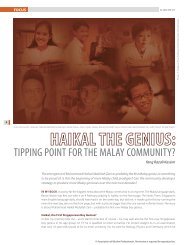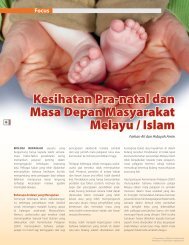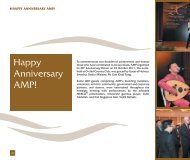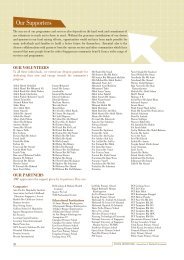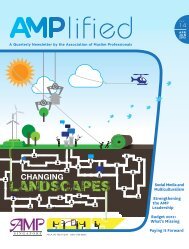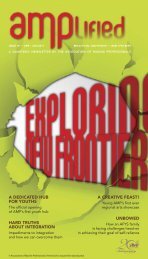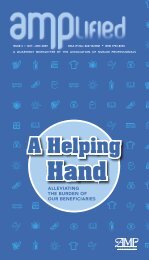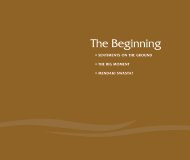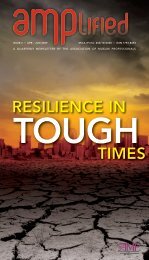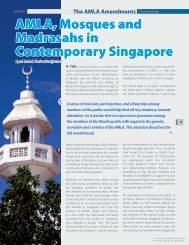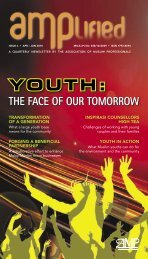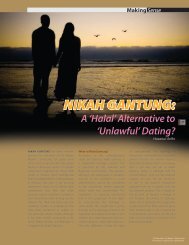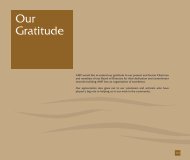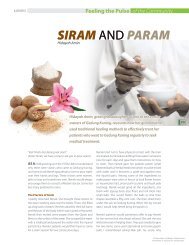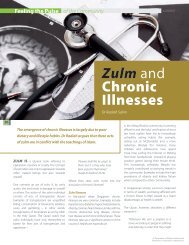The AMLA Amendments - Association of Muslim Professionals
The AMLA Amendments - Association of Muslim Professionals
The AMLA Amendments - Association of Muslim Professionals
You also want an ePaper? Increase the reach of your titles
YUMPU automatically turns print PDFs into web optimized ePapers that Google loves.
Focus<br />
KARYAWAN<br />
4<br />
treatment and justice practised are also consonant with the<br />
religion. In the case <strong>of</strong> secular laws that contradict Islamic norms,<br />
such as permissibility <strong>of</strong> betting and consumption <strong>of</strong> liquor, the<br />
position is that these rules do not oblige <strong>Muslim</strong>s to follow and<br />
we have the choice not to accept them.<br />
For a <strong>Muslim</strong> in Singapore, his identity gives him the anchor or<br />
foundation to relate to what is truly Islamic both in faith and<br />
practice and encourages a healthy association with <strong>Muslim</strong>s<br />
elsewhere while deeply rooted to the ethos <strong>of</strong> the Singaporean<br />
society. He should judge events in the world, especially those<br />
affecting <strong>Muslim</strong>s, through the lenses <strong>of</strong> universal principles<br />
<strong>of</strong> justice, sense <strong>of</strong> fairness and objectivity – virtues <strong>of</strong> his own<br />
Islamic faith. By the same token, if he discovers through these<br />
same lenses that <strong>Muslim</strong>s in certain situations or events are<br />
subjected to injustice or harm, he should respond in a manner<br />
appropriate to the challenge and this calls for objectivity,<br />
sometimes creativity, and in accordance with the rule <strong>of</strong> law <strong>of</strong><br />
the country he resides in.<br />
<strong>The</strong> Next Challenge<br />
Prominent scholar Abdullah Saeed observes a positive trend in<br />
that minority <strong>Muslim</strong>s are active participants in their societies<br />
and contribute to Islamic scholarship. <strong>The</strong>y are at the forefront <strong>of</strong><br />
the rethinking and rejuvenation agenda in Islam’s journey to find<br />
its right <strong>of</strong> place in modern society. For Singaporean <strong>Muslim</strong>s,<br />
through our consistent and active involvement over the years,<br />
we have developed strong institutions that are highly regarded.<br />
Examples are our internal management <strong>of</strong> Islamic affairs and coexistence<br />
<strong>of</strong> the Syariah Court and secular legal system.<br />
Our next challenge is to instill dynamism in our participation in<br />
the national process to influence the destiny and future <strong>of</strong> the<br />
country. We would have arrived the day when pious <strong>Muslim</strong>s are<br />
highly respected for their commitment to their religion and their<br />
unwavering care and concern extended to their fellow citizens,<br />
and when their efforts and dedication to ensure the well-being<br />
<strong>of</strong> Singapore is regarded with the highest esteem.<br />
Another dimension <strong>of</strong> integration is the issue <strong>of</strong> political or<br />
national and religious identities. <strong>The</strong>se identities sometimes<br />
collide or run into tension, especially for minority communities<br />
given the strong “indigenous” pulls. Another cause for such<br />
tension is the perceived incompatibility between a construct<br />
that transcends territorial boundaries and that <strong>of</strong> a nation-state<br />
and its attendant obligations <strong>of</strong> citizenry.<br />
Needless to say, many disputes in the world affecting <strong>Muslim</strong>s<br />
are the result <strong>of</strong> this tension, for example, <strong>Muslim</strong>s in Germany<br />
and other European states where there is a strong push for<br />
assimilation with the status quo. <strong>The</strong> key question here is can the<br />
identities co-exist and <strong>Muslim</strong>s live in harmony with their fellow<br />
citizens in these countries<br />
Although our circumstances as <strong>Muslim</strong>s in Singapore are<br />
different and our experience with co-existence in a multireligious<br />
society has been quite successful thus far, we remain<br />
cautiously optimistic for the future. In more ways than one, we<br />
in Singapore have demonstrated that we can be good <strong>Muslim</strong>s<br />
and good citizens at the same time.<br />
However, identity, whether national or religious, is constantly<br />
evolving and the external environment and conditions <strong>of</strong> society<br />
have an influence on the dynamic inter-play <strong>of</strong> the various forces<br />
that shape identity. Ultimately it is about winning the hearts<br />
and minds <strong>of</strong> <strong>Muslim</strong>s and non-<strong>Muslim</strong>s alike in this sustained<br />
journey towards co-existence and a shared destiny.<br />
Yus<strong>of</strong> Sulaiman is the Centre Director <strong>of</strong> the Centre for<br />
Research on Islamic and Malay Affairs (RIMA), the research<br />
arm <strong>of</strong> the <strong>Association</strong> <strong>of</strong> <strong>Muslim</strong> Pr<strong>of</strong>essionals (AMP). <strong>The</strong><br />
views expressed are his own.<br />
© <strong>Association</strong> <strong>of</strong> <strong>Muslim</strong> Pr<strong>of</strong>essionals<br />
Permission is required for reproduction.



